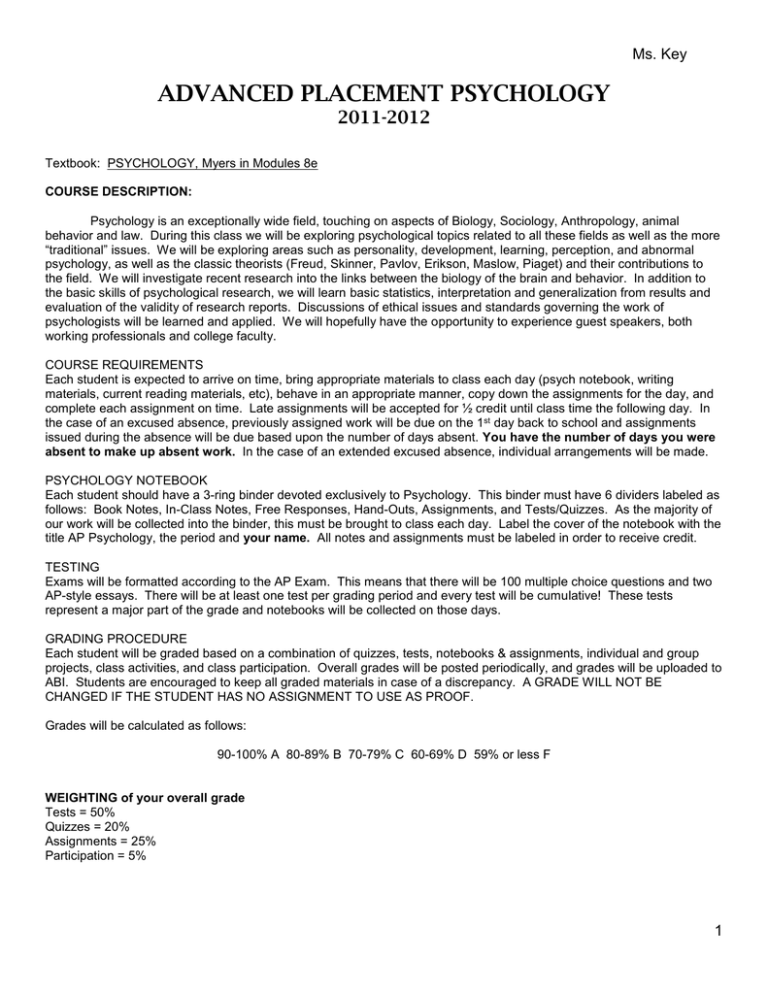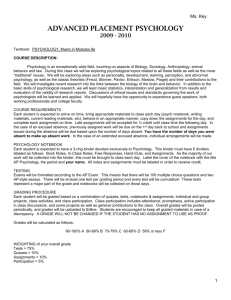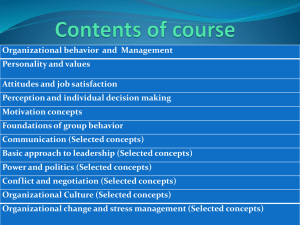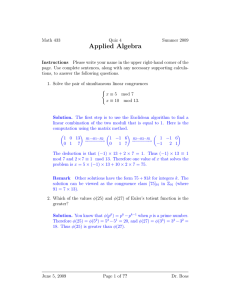ADVANCED PLACEMENT PSYCHOLOGY 2011-2012 Ms. Key
advertisement

Ms. Key ADVANCED PLACEMENT PSYCHOLOGY 2011-2012 Textbook: PSYCHOLOGY, Myers in Modules 8e COURSE DESCRIPTION: Psychology is an exceptionally wide field, touching on aspects of Biology, Sociology, Anthropology, animal behavior and law. During this class we will be exploring psychological topics related to all these fields as well as the more “traditional” issues. We will be exploring areas such as personality, development, learning, perception, and abnormal psychology, as well as the classic theorists (Freud, Skinner, Pavlov, Erikson, Maslow, Piaget) and their contributions to the field. We will investigate recent research into the links between the biology of the brain and behavior. In addition to the basic skills of psychological research, we will learn basic statistics, interpretation and generalization from results and evaluation of the validity of research reports. Discussions of ethical issues and standards governing the work of psychologists will be learned and applied. We will hopefully have the opportunity to experience guest speakers, both working professionals and college faculty. COURSE REQUIREMENTS Each student is expected to arrive on time, bring appropriate materials to class each day (psych notebook, writing materials, current reading materials, etc), behave in an appropriate manner, copy down the assignments for the day, and complete each assignment on time. Late assignments will be accepted for ½ credit until class time the following day. In the case of an excused absence, previously assigned work will be due on the 1st day back to school and assignments issued during the absence will be due based upon the number of days absent. You have the number of days you were absent to make up absent work. In the case of an extended excused absence, individual arrangements will be made. PSYCHOLOGY NOTEBOOK Each student should have a 3-ring binder devoted exclusively to Psychology. This binder must have 6 dividers labeled as follows: Book Notes, In-Class Notes, Free Responses, Hand-Outs, Assignments, and Tests/Quizzes. As the majority of our work will be collected into the binder, this must be brought to class each day. Label the cover of the notebook with the title AP Psychology, the period and your name. All notes and assignments must be labeled in order to receive credit. TESTING Exams will be formatted according to the AP Exam. This means that there will be 100 multiple choice questions and two AP-style essays. There will be at least one test per grading period and every test will be cumulative! These tests represent a major part of the grade and notebooks will be collected on those days. GRADING PROCEDURE Each student will be graded based on a combination of quizzes, tests, notebooks & assignments, individual and group projects, class activities, and class participation. Overall grades will be posted periodically, and grades will be uploaded to ABI. Students are encouraged to keep all graded materials in case of a discrepancy. A GRADE WILL NOT BE CHANGED IF THE STUDENT HAS NO ASSIGNMENT TO USE AS PROOF. Grades will be calculated as follows: 90-100% A 80-89% B 70-79% C 60-69% D 59% or less F WEIGHTING of your overall grade Tests = 50% Quizzes = 20% Assignments = 25% Participation = 5% 1 Ms. Key Please be sure that you understand an assignment when it is given. Clear up any confusion before you leave the classroom. Once you leave the classroom, you are responsible for any assignment given. If you are absent, it is your responsibility to ask about make-up work. CLASSWORK. Do you agree to: (Please initial) 1-Actively read and make notes on each chapter (5 hours a week at least). 2-Do in class experiments, chapter written activities/readings, and group work. 3-Complete assignments over breaks. 4-Take at least one AP style test (100 multiple choice questions and 2 modified essays) each grading period. 5-Save all material in an organized way. 6-Take the AP exam on May 7th (afternoon session). CONDUCT. These simple agreements will maximize your psychology experience. (Please initial) 1-In this classroom I will not ever put anyone down in any way. 2-When asked, I will keep personal information confidential. 3-I will avoid being disruptive in class. By signing below, you acknowledge that you have read and understand the syllabus. You are also agreeing to act with academic integrity (no cheating, no plagiarism, etc.). Signed Parent Witness PARENT PERMISSION I hereby give my permission for to hear about and work with sensitive topics, including sexual issues, as they relate to psychology. I give my permission for my student to watch videos related to psychology as well. x Printed Name: _________________________________________ If you have any questions regarding these or other issues, I can be reached through the school at (951) 894-5750 x6667 or by email at hkey@murrieta.k12.ca.us. 2 Ms. Key SUMMARY OUTLINE: 2011-2012 ADVANCED PLACEMENT PSYCHOLOGY CONTENT AREA 1) History and Approaches a) Logic, Philosophy, and History of Science b) Approaches i) Biological ii) Behavioral iii) Cognitive iv) Humanistic v) Psychodynamic vi) Sociocultural vii) Evolutionary/Sociobiological TEXTBOOK MODULES % OF AP EXAM Mod 1 2-4 Mod 2-3 6-8 Mod 4-5 8-10 Mod 12-17 7-9 Mod 6-11 7-9 Mod 21-23 7-9 2) Methods and Stats a) Research Methods b) Experimental, Correlational, and Clinical Research: i) Correlational (e.g., observational, survey, clinical) ii) Experimental iii) Statistics 1. Descriptive 2. Inferential iv) Ethics in Research 3) Biological Bases of Behavior a) Physiological Techniques (e.g., imaging, surgical) b) Neuroanatomy c) Functional Organization of Nervous System d) Neural Transmission e) Endocrine System f) Genetics 4) Sensation and Perception a) b) c) d) e) Thresholds Sensory Mechanisms Sensory Adaptation Attention Perceptual Processes 5) Developmental Psychology The Nature and Nurture of Behavior / The Developing Person a) Life-Span Approach b) Research Methods (e.g., longitudinal, crosssectional) c) Heredity-Environment Issues d) Developmental Theories e) Dimensions of Development i) Physical ii) Cognitive iii) Social iv) Moral f) Sex Roles, Sex Differences 6) Learning a) Classical Conditioning 3 Ms. Key b) c) d) e) Operant Conditioning Cognitive Processes in Learning Biological Factors Social Learning 7) Cognition – Memory and Language a) b) c) d) Memory Language Thinking Problem Solving and Creativity Mod 24-30 8-10 Mod 31-33 5-7 Mod 47-54 13-17 Mod 55-58 7-9 Mod 44-46 6-8 Mod 34-40 6-8 8) Testing and Individual Differences a) b) c) d) e) f) g) Standardization and Norms Reliability and Validity Types of Tests Ethics and Standards in Testing Intelligence Heredity/Environment and Intelligence Human Diversity 9) Disorders and Treatment a) b) c) d) e) f) g) h) i) j) k) Definitions of Abnormality Theories of Psychopathology Diagnosis of Psychopathology Anxiety Disorders Somatoform Disorders Mood Disorders Schizophrenic Disorders Organic Disorders Personality Disorders Dissociative Disorders Treatment Approaches 1. Insight Therapies: Psychodynamic / Humanistic Approaches 2. Behavioral Approaches 3. Cognitive Approaches 4. Biological Approaches (psychopharmacology/psychosurgery) l) Modes of Therapy (e.g., individual, group) m) Community and Preventive Winter Break Treatment (if not finished) 10) Social Psychology a) b) c) d) e) f) g) Group Dynamics Attribution Processes Interpersonal Perception Conformity, Compliance, Obedience Attitudes and Attitude Change Organizational Behavior Aggression/Antisocial 11) Personality a) b) c) d) Personality Theories and Approaches Assessment Techniques Self-Concept, Self-Esteem Growth 12) Motivation and Emotion a) Bases b) Theories of Motivation c) Hunger, Thirst, Sex, and Pain 4 Ms. Key d) Social Motives e) Theories of Emotion Spring Break 13) Stress and Health 14) States of Consciousness a) Sleep and Dreaming b) Hypnosis c) Psychoactive Drugs Mod 41-43 2 Mod 18-20 2-4 15) Review for AP Exam Test Date: Monday, May 7th (afternoon) 16) Psychology Final Project: Observing/ Testing Human Behavior. Group Psychology Activity. 5



